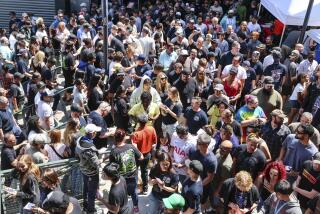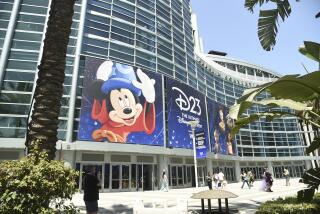ENTERTAINMENT : Disneyland, Unions Try to Resolve Contract Dispute
- Share via
Disneyland management and union representatives for 2,400 employees, apparently far apart on a new contract, negotiated into Thursday night as they attempted to resolve wage and benefit issues.
The employees, whose jobs range from operating rides to sweeping Main Street, are scheduled to vote Saturday on management’s final offer and on whether to authorize a strike. The contract was scheduled to expire at midnight Thursday. Management personnel are currently being trained to operate the park in the event of a strike. The employees are represented by a coalition of five unions and make up more than 25% of Disneyland’s full-time, permanent staff of 8,000 workers.
The park workers are the same group who went out on a chaotic, bitter strike five years ago that lasted for 22 days--the longest work stoppage in the park’s history.
By late Thursday, Disneyland management was offering a two-tier wage system. Workers with four or more years seniority would receive a 2% pay increase for each of the next three years, said a member of the union’s negotiating team, John Corente, who is with the Bakery & Confectionery Workers, Local 83.
Employees with fewer than four years seniority would get the 2% pay hikes--until they reached the fourth year of employment. Then those workers would be raised to the current four-year pay level.
Want More Money
“It’s lousy,” Corente said of the offer. “I’m stupefied by it.”
Corente said the unions now are asking for two 8% wage hikes over three years. The top rate of pay at the park is about $9.94 for permanent, hourly personnel--with slight variations according to jobs.
Corente added that the unions object to a management proposal to change the employees’ health plan by putting all of the company’s 32,000 workers into one plan. Currently, workers have a choice of health plans.
The contract talks come at a time of record earnings for Walt Disney Co., which owns Disneyland. For the second quarter ended March 31, net income rose 24% to $149 million. Michael D. Eisner, chairman of Disney, earned $40.1 million in 1988, putting him at the top of Business Week magazine’s list of highest-paid bosses.
Disneyland spokesman Bob Roth declined to comment on details of the negotiations.
But the Anaheim amusement park has been girding for a strike for at least several weeks. Vacations for management employees have been canceled from mid-September through mid-October because they could be needed to fill-in for striking workers. Since Monday night, the park has been training non-union management and secretarial staff to operate the park’s rides.
Other Major Issues
“I don’t expect we’ll have anything settled by midnight,” Roth said. “But I don’t expect a strike either. We are training people just as a safety measure.”
In addition to wages and health benefits, at least two other issues have become big bones of contention among the workers:
- Management is demanding that jobs be “interchangeable”--so that ride operators, for example, can be ordered to sweep floors and merchandisers can be told to sell hot dogs.
“It amounts to a very effective way of decreasing the work force,” said Tom Ramsay, a spokesman for the five-union coalition. Ramsay explained that such a policy allows a company to shift workers to other departments--and, in turn, lay off other employees.
- Management wants to change the “lead rate”--or premium pay for ride operators who oversee co-workers. Under the current system, “lead operators” are paid 50 cents more an hour than the top pay rate. The change would allow Disneyland to pay some part-time workers substantially less than the top rate of pay even if they are lead operators.
Employees affected by the negotiations work as sales clerks, ride operators, wardrobe personnel, ticket sellers, bus boys, warehouse workers, candy makers, janitors, merchandise markers and a limited number of food-service personnel, such as employees of the Golden Horseshoe theater.
Workers Got Bonus
Five years ago, the strike by those workers earned disappointing results. The unions accepted a contract that slowed pay advancement for incoming workers, and benefits were reduced. The striking workers also settled for a two-year wage freeze.
A new contract negotiated in September, 1986, gave full-time employees a bonus of about $1,000 rather than across-the-board raises.
Ramsay, the union spokesman, said that on Saturday workers will vote to either accept Disneyland’s final offer or authorize the union to take a strike action. A 51% vote is needed to approve the contract.
If workers vote to authorize a strike, the union’s negotiating committee decides whether to call a strike. “Ninety-nine times out of 100, we do,” he said.
Several employees, however, said the disappointing results of the last strike would probably mean there would be little worker support for another job action. “The general consensus among the rank-and-rile is not to strike but to force the company to come back and renegotiate,” said Ross Jones, a part-time ride operator. “Depending on what the company comes back with, it could be accepted.”
Jones and others noted that contract negotiations between the park and most food-services workers last November resulted in a 4% pay hike for each of the next three years.
More to Read
The biggest entertainment stories
Get our big stories about Hollywood, film, television, music, arts, culture and more right in your inbox as soon as they publish.
You may occasionally receive promotional content from the Los Angeles Times.










